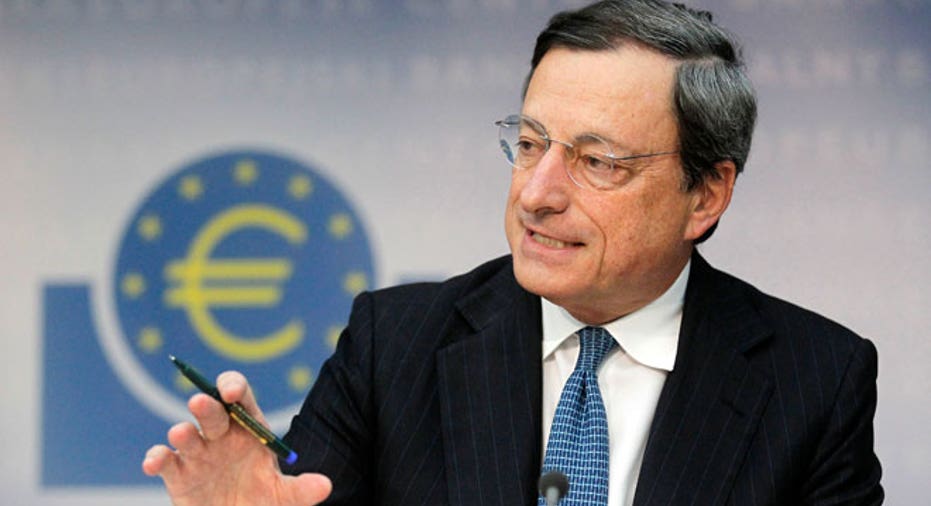Draghi to Mount Defense of ECB

ECB President Mario Draghi is likely to drive home the case for ultra-loose monetary policy on Thursday, hitting back at a barrage of criticism in Germany of its recipe for tackling the economic malaise.
Having yet to implement or fully explain some of the measures he announced last month, Draghi is set to give investors more information about the European Central Bank's latest plan to buy corporate bonds.
Widely expected to hold interest rates at record lows, the ECB will want to see how the two stimulus packages announced since December play out before unveiling any new measures, but Draghi will also reaffirm his guidance for low or even lower rates for many years to come.
Indeed, the ECB's biggest headache may be a nasty spat with Berlin after Finance Minister Wolfgang Schaeuble said that monetary policy was causing "extraordinary" problems for Germany and was in part to blame for the rise of the right-wing anti-immigration Alternative for Germany (AfD).
Late on Wednesday, Schaeuble stuck to this tough line, saying that "a long period with zero and negative interest rates is not a sensible situation".
The ECB has been easing policy aggressively, cutting rates deeper into negative territory and expanding asset buys in a bid to prop up inflation, which now stands at zero - far off its 2 percent target.
Although market-based inflation forecasts have failed to budge, oil prices are rising and analysts say the ECB may have grounds for cautious optimism.
BASHING IN FASHION
But the disagreement with Germany, the strongest economy in the euro zone and de facto leader of the currency bloc, is cause for concern. Conservative German politicians recently even called for Draghi's successor to be a German.
"ECB-bashing has become fashionable in Germany," said Carsten Brzeski, an analyst of ING.
"This can paralyse the euro zone because it means the policy mix continues to be in deadlock. They will not move on issues such as Greek debt restructuring."
The ECB seems to have the edge in the debate for now after Schaeuble backtracked on some of his comments and Bundesbank chief Jens Weidmann, the ECB's biggest critic to date, spoke out in favour of central bank independence, arguing that the ECB's expansionary monetary policy stance was appropriate.
The criticism is nonetheless damaging. "Any conflict between a major stakeholder and top management carries risks," Berenberg analyst Holger Schmieding said.
"It may destabilise the institution and blunt its message," Schmieding said. "The current dispute goes a bit beyond an awkward nuisance. At the margin, it may constrain the ECB's room for manoeuvre slightly and make ECB monetary policy a little less effective."
Negative rates are hurting Germany's fragmented and cash-saturated banking system disproportionately, raising the prospect that hundreds of smaller banks, primarily small savings banks, could become unviable.
IMF figures suggest German and Portuguese banks will take the biggest earnings hit from falling interest rates, compressing margins and possibly thwarting lending growth.
Draghi is likely to reject the German criticism, outlining an even darker path for growth and inflation if the ECB gives up and arguing that the bank makes policy for a 19-member bloc, not just one of its members.
EASING FURTHER OUT?
Even if the ECB takes a relatively upbeat stance on Thursday, its longer term prospects have barely improved.
The trade-weighted euro is firming and market-based inflation expectations are well below the ECB's target, suggesting that further policy easing will be debated again later this year.
"Whether the central bank takes measures ultimately depends, as it has in the past, on the development of the economy and inflation," Commerzbank said. "We believe that both should tend to disappoint. Consequently, the ECB will probably become active again."
The euro zone five-year, five-year breakeven rate , a key market-based expectation that predicts long-term inflation, dipped to 1.39 percent on Wednesday, well below the 1.49 percent when the ECB announced its March package.
Of particular concern could be the nearly 5 percent rise in the trade-weighted euro since its early December low. A 5 percent appreciation in the euro dampens inflation by roughly 0.3 percentage points after one year, according to Nordea.
"Although the pace of currency appreciation has not been alarming, the ECB is very likely to be unhappy with the stronger euro," UniCredit said. "However, there is not much the central bank can do about it, at least for now."
"Therefore, the ECB will likely continue its tricky balancing act by, on the one hand, reaffirming in the introductory statement that rates can go lower if needed, and, on the other hand, acknowledging in the Q&A that the downside on rates is not unlimited," the Italian bank added.
(Additional reporting by Francesco Canepa; editing by John Stonestreet)



















